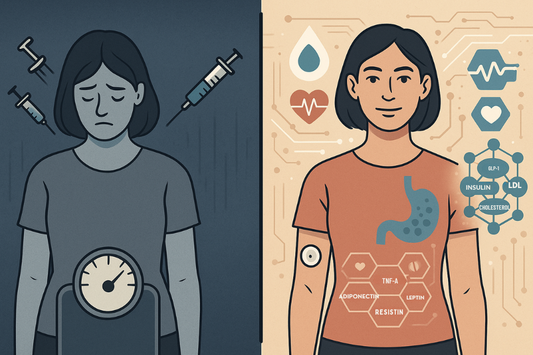Did you know that prolactin, a hormone that is usually associated with lactation in women, plays a surprisingly important role in men's health, influencing everything from sexual function to mood, motivation, and energy levels? A lot of this due to its interplay with testosterone and dopamine.
Prolactin should always be checked when performing a testosterone test in men, because high levels are associated with and can cause low testosterone.
Raised prolactin is usually caused by lifestyle or medication. Understanding why levels might be high is the first step when optimising testosterone levels.
Understanding the testosterone cascade for optimisation.

The testosterone hormone cascade begins in the brain with the hypothalamus releasing gonadotropin-releasing hormone (GnRH). GnRH stimulates the pituitary gland to produce luteinising hormone (LH) and follicle-stimulating hormone (FSH). LH then signals the Leydig cells in the testes to produce testosterone.
A feedback loop regulates testosterone levels: high testosterone levels can inhibit the production of GnRH and LH, maintaining hormonal balance.
What is Prolactin?
Produced by the pituitary gland, prolactin is crucial for reproductive and metabolic functions. In men, it's involved in testosterone regulation and sperm production.
With respect to testosterone, when prolactin levels are elevated, it can inhibit the secretion of gonadotropin-releasing hormone (GnRH) from the hypothalamus. GnRH is crucial for stimulating the pituitary gland to produce luteinising hormone (LH) and follicle-stimulating hormone (FSH), which are key hormones that signal the testes to produce testosterone.
Therefore, when prolactin levels are high, the cascade of hormonal events that lead to testosterone production is disrupted, resulting in lower testosterone levels.Elevated Prolactin and Its Effects
While optimal prolactin levels support reproductive and general health, elevated levels, known as hyperprolactinemia, can lead to several issues:
- Sexual Health: High prolactin can reduce libido, cause erectile dysfunction, and lead to infertility by inhibiting testosterone production.
- Mood and Motivation: Prolactin can impact mood by altering neurotransmitter pathways, potentially leading to depressive symptoms. It inversely affects dopamine, a key neurotransmitter for motivation and pleasure. Thus, high prolactin levels might decrease motivation and enjoyment in daily activities.
- Energy Levels: Excessive prolactin levels are often accompanied by fatigue and decreased vitality, partly due to reduced testosterone levels.
Low Prolactin is rare
Low prolactin levels are less common and typically not associated with significant health concerns in men. However, extremely low levels (i.e. <5mIU/L) may indicate pituitary gland issues; if they are this low, you should see your Doctor to investigate further.
Lifestyle, Diet, and Exercise: Natural Strategies to Manage Prolactin Levels
What we do know is that there are many things you can do to get your prolactin back to healthy levels if they are high and hence improve your testosterone.
Lifestyle modifications can help manage prolactin levels:
- Stress Reduction: Yet another reason to manage stress. A lot of the talk is about cortisol, but prolactin is another reason that it is a mood killer. It’s easy to talk about but can often be challenging to do- especially if you are stressed!
Techniques such as yoga, meditation, and deep breathing can lower stress and prolactin levels.
- Improved Sleep: Quality sleep is vital for hormonal balance. If you believe that sleep is for the weak, you have it the wrong way around. Sleep will make you weak, literally!
A lot of research has been done to look at mouth breathing and it’s effect on testosterone levels. Mouth taping to avoid this is a simple and effective way to boost testosterone levels and your partner will probably thank you for it as well.
- Nutritional biohacks: A balanced diet rich in vitamins and minerals supports hormonal health. B vitamins and zinc, help regulate prolactin levels. In particular high strength vitamin B6 helps to inhibit the release of prolactin.
- Regular Physical Activity: Moderate exercise can improve overall hormonal balance, but overtraining should be avoided as it can elevate stress and prolactin levels.
Exercising with the large muscle groups but NOT to failure will increase testosterone.
Biohacks and supplements for Prolactin Management
Zinc
Zinc's role in reducing prolactin levels is attributed to its influence on the neuroendocrine system. Zinc is essential for the activity of numerous enzymes and plays a critical role in synthesising, storing, and releasing neurotransmitters, including dopamine.
By facilitating dopamine synthesis and function, zinc can help maintain adequate dopamine levels necessary for prolactin inhibition. Additionally, zinc has been shown to directly affect the pituitary gland, potentially affecting the secretion of hormones, including prolactin.
Vitamin E (Tocopherol)
Vitamin E's mechanism in prolactin regulation is less directly understood than vitamin B6 and zinc, but it's believed to involve antioxidant properties and effects on the endocrine system. Vitamin E can protect the integrity of pituitary cells and dopamine neurons from oxidative stress, ensuring the efficient production and release of dopamine.
By maintaining healthy dopamine pathways, vitamin E contributes to the regulation of prolactin levels. Additionally, some evidence suggests that vitamin E can influence the sensitivity of the pituitary gland to dopamine, potentially enhancing the inhibitory effect of dopamine on prolactin secretion.
The Refractory Period and Prolactin's Broader Impact
Prolactin is also responsible for the refractory period in men post-sex, leading to temporary sexual satisfaction and a decrease in arousal. This period allows for psychological and physical recovery. However, the hormone's role in mood regulation and energy cannot be understated. Elevated prolactin levels can dampen motivation and reduce energy by disrupting the delicate balance of the body's hormonal environment.
Addressing Elevated Prolactin
If prolactin levels are mildly elevated due to lifestyle factors, addressing these through dietary changes, stress management, and regular exercise can be beneficial. However, significantly higher levels often indicate underlying conditions such as prolactinoma or thyroid issues and require medical intervention.
Conclusion
Prolactin is crucial to men's health, impacting more than just reproductive function. Its effects on mood, motivation, energy, and overall well-being highlight the importance of hormonal balance.
Understanding prolactin's impact can empower and motivate you to take proactive steps towards maintaining your health, whether through lifestyle adjustments, dietary changes, or seeking medical advice when necessary.
Hormonal health is a critical component of overall well-being, and managing prolactin levels increases your enjoyment of day-to-day life.






